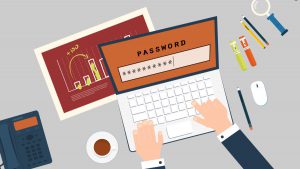Protecting yourself online and using security precautions can help protect your identity and personal information.
Ways you can protect yourself online:
- Using strong passwords: Passwords provide security to your accounts, keeping unauthorized users out. When creating a password, it is important to create one that is unique and does not contain any personal information that would be easily accessible for someone to find on the internet (i.e: name, family member’s name, birth date, pet’s name). Try using a mix of numbers and signs (i.e: “%”, “!”, “$”).
- Avoid using unsecured Wi-Fi: Using unsecured Wi-Fi can make you vulnerable to hackers and hacker access. Try using a VPN, virtual private network, when you are unable to access privately secure internet access. Using a VPN will allow the date you send and receive to be encrypted, making it more difficult for hackers to intercept your network.
- Use two-factor authentication: Two-factor authentication is a method of digital authentication that requires you to verify your identity further after entering your password into one of your accounts. Two-factor authentication may work by either sending a notification to your phone number or email, asking you to enter an additional code, or by having you answer additional security questions.

Leave a Reply
You must be logged in to post a comment.